
The UK seafood that could send you to jail
There are only around 20 days a year when the law allows you to go down to the shoreline on the English Channel Island of Guernsey in search of a prized mollusc that, when French was the dominant language here until the late 19th Century, was known as oreille de mer (sea ear) – though one engaging variation dubbed it “Venus Ear”.
Now known as ormer, this is the most northerly member of the abalone family, with dozens of global cousins found in places as far apart as Senegal, Australia, Japan and California. But only in the Channel Islands are they gathered by hand off the seashore – and wrapped in a host of rules.
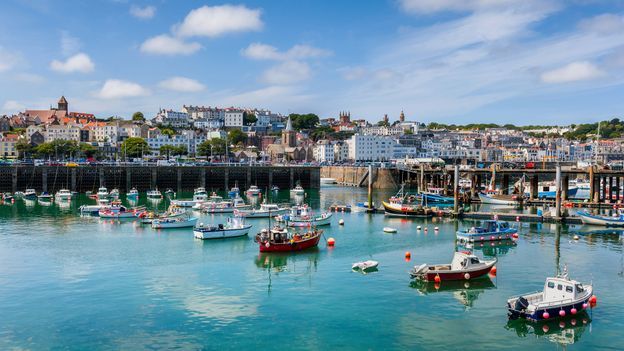 Guernsey lies just west of France but is a self-governing British Crown dependency
Guernsey lies just west of France but is a self-governing British Crown dependency
Ormers are as distinctive as Guernsey itself. The island has been a British Crown Dependency for 800 years, despite sitting a few miles off the coast of France. Rustic “parishes” bearing sturdy Anglo-Saxon names like St Sampsons and St Peters frame bays with Gallic names like Petit Bot and L’Ancresse, attracting painters like Renoir to capture their beauty.
This melange of national influences extends to an old island language now making a comeback in schools and the media after a couple of centuries in the doldrums. Rooted in ancient Norman French, Guernesiaise is used in official ceremonies, as well as naming traditional local dishes like the apple cake gâche mêlaïe (pronounced “gosh malar”).
While you know what to expect from apple cake, ormers are harder to pin down. “They're the Marmite of the mollusc menu,” admitted long-time ormer gatherer Peter Perrio. “People seem to either love them or hate them with equal intensity.”
For those who love them, the intensity is, well, pretty intense. One early culinary reference in 1673 described ormer as “much bigger than an oyster... but infinitely more pleasant to the gusto, so that an epicure would think his pallat in paradise if he might but always gormandise on such delitious ambrosia”.
Three centuries later, in his 1981 work The Book of Ebenezer LePage – a fictional reflection of one man's life on Guernsey – Gerald Basil Edwards wrote: “The food I like best of all foods is ormers; [but] I can’t say what ormers taste like. They are not like fish, flesh or fowl. They are like no other food on Earth.”
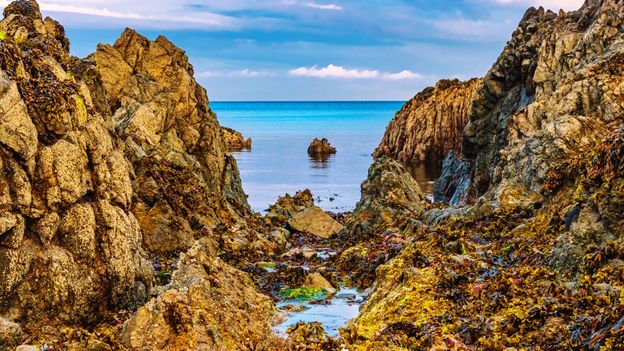 Harvesting ormer is governed by strict rules and only possible during especially low tides
Harvesting ormer is governed by strict rules and only possible during especially low tides
The difficulty of pinning down the taste for newcomers remains. In a 2011 UK Aquatic Plant Society thread, one user opined that ormers “have a unique flavour that is not really in most people's vocabulary to describe! They are delicious but, not even remotely fishy tasting.”
Meanwhile, Taste Atlas – an online global guide to myriad traditional foodstuffs – also hedged its bets, describing ormer in positive but rather vague terms. “Its flesh is succulent and has a unique, mild, and slightly meat-like, but still distinctively molluscan flavour.”
As a regular consumer, Perrio is similarly keen not to be pinned down – in the same way you might not want to be too limiting in trying to describe a piece of music or art. “Properly cooked ormers have a texture similar to squid, octopus or cuttlefish,” he told me. “The taste really is very distinctive and not directly comparable to anything else. If pushed, I think the nearest comparison would be razor clams.
The fact that ormer hunters obey the bidding of the Moon adds magic to this mollusc. The law only allows them to be gathered on so-called “ormering tides”, designated as being only on days of a full or new Moon between New Year's Day and the end of April, plus two days following either lunar phase. These are the days when Earth's celestial partner has the biggest effect on tidal ranges – something even more notable on an island with one of the highest tidal ranges in the world, at up to 10m from the highest to lowest tides.
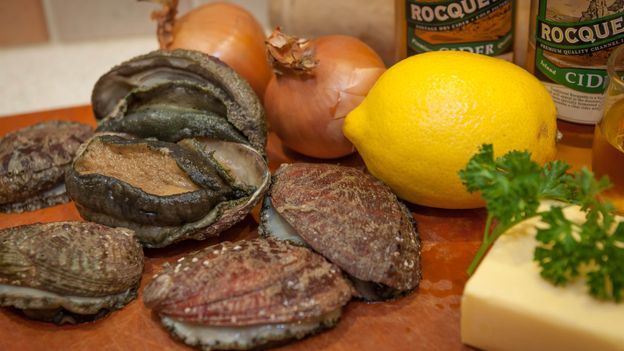 A favourite way of preparing the molluscs is to sauté them in local Rocquette cider
A favourite way of preparing the molluscs is to sauté them in local Rocquette cider
As the Moon pulls back the ocean to spring minimums, these days offer the best exposure to the rock and crevices that ormers patrol to feed, feasting like gourmands themselves on delicate seaweed fronds. And it is amid Guernsey's low-tide rocks and exposed clumps of seaweed that ormer hunters go in search, using a variety of techniques and tools to reveal the molluscs hiding away here.
“There are two main methods of ormering, called ‘turning’ and ‘cricking’,” Perrio explained. “Turning involves finding a likely looking patch of loose rocks – ie not attached to the seabed – and searching through them carefully, where the ormer can often be found hiding.”
“Cricking involves carefully searching nooks and crannies that abound in the sides of gullies in the bedrock and under overhanging boulders too big to turn,” he continued. “This relies on a keen eye for an ormer in a dark and constricted space and being prepared to feel at arm’s length under rocky overhangs or in cracks. Many people have favoured areas for this sort of work, with an intimate knowledge of where the best holes are to be found, often having been passed down through the generations of a family.”
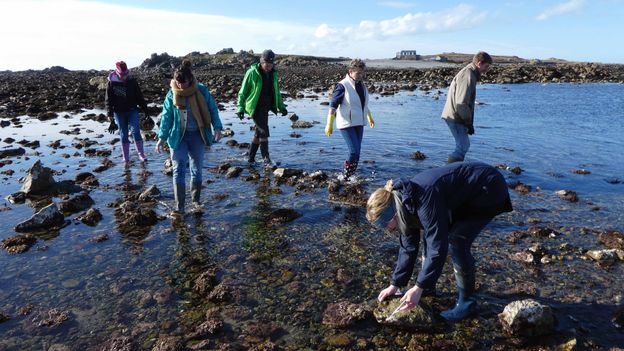 The collection of ormers is only allowed on specific days between January and April
The collection of ormers is only allowed on specific days between January and April
But finding an ormer doesn't mean your work is done, thanks to the strength with which they can cling to rocks. So, tools come into play. “Gatherers are often armed with a traditional ormering hook,” explained Perrio. “This has a flattened outside edge or end, to assist with prising the ormer away from its refuge. Others rely on some sort of scraper or blade.”
As well as limiting the “when”, strict laws exist on the “how” of seeking ormer in Guernsey. You cannot collect an ormer while partially or fully submerged – a hangover from the days when people were once allowed to go diving for ormers in deeper water. And ormers can also only leave the island with explicit permission – just a small supply is exported to seafood markets in Japan, where they can fetch up to £150 per kilo.
Break any of the rules and you can be fined up to £5,000 or face six months in prison. In fact, illicit ormer hunting saw Guernsey police carry out the world's first recorded underwater arrest. It was 1968, and a passer-by noticed a diver bringing up ormer from the sea off Castle Cornet, the 13th-Century harbour citadel guarding the island capital St Peter Port. Police were called, and Constable David Archer donned scuba gear to dive down and apprehend a Mr Kempthorne-Leigh on the seabed – proving the long arm of the law knows no limits when it comes to ormers.
Like many of the world's most interesting foods, people argue about the best way to eat ormers. When celebrated British seafood chef Rick Stein visited the island, he opted for the “slice-it-thin-and-flash-fry” approach. By contrast, another traditional Guernsey method involves beating the ormer with a wooden mallet, coating it in flour and simmering for eight hours in gravy. The Taste Atlas, meanwhile, lists a 17th-Century casserole combining ormers with pork belly, carrots, shallots, butter and bay leaves.
“Ormers need to be cooked either very slowly or very quickly – anything else will result in a culinary disaster,” said Perrio. “For me, ormers are best eaten as fresh as possible, with stir frying or pan roasting. For a quick sandwich, it's hard to beat ormer strips flash fried to crispy deliciousness in Guernsey butter. Sauteed in local Rocquette cider is another favourite; the alcohol helps tenderise the flesh as well. I do like an old-fashioned slow cook in gravy, but usually can't wait to get stuck in.”
 Ormers can be prepared in a variety of ways, from flash frying in butter to slow cooking in a stew
Ormers can be prepared in a variety of ways, from flash frying in butter to slow cooking in a stew
This is also a food where you really earn your culinary payoff, with Perrio admitting that “ormering in the winter months is a pretty full-on experience,” citing freezing sea temperatures and the likelihood of a complete soaking.
There are other perils too. The slippery and uneven nature of the area you work presents dangers, from falls to potentially trapped extremities. “Other dangers arise from cuts or crushed fingers,” said Perrio. “You also have to pay careful attention to any building swell, and the incoming tide, which can often seem to rush in much quicker than it went out.”
Despite these travails, locals have gathered ormers for centuries – though these molluscs actually date back at least 80 million years to when dinosaurs wandered the shore. It isn't known whether the dinosaurs had a taste for ormer, but they have often provided an important source of sustenance for Guernsey's hungry humans in more recent times. “Shore gathering was a way to supplement food supplies when times were hard – ormers were often pickled to preserve them,” said Perrio. They also provided food during the dark years of the island's occupation by German forces from 1940-45, when other survival dishes included Potato Peel Pie.
Some years have seen legendary ormer harvests. Twenty thousand were reputedly caught on a single day at Perelle Bay in 1841, while during one low tide in 1965, 400 shore gatherers harvested nearly 31,000 ormers. Two years later, an estimated 200,000 ormers were gathered over the entire season.
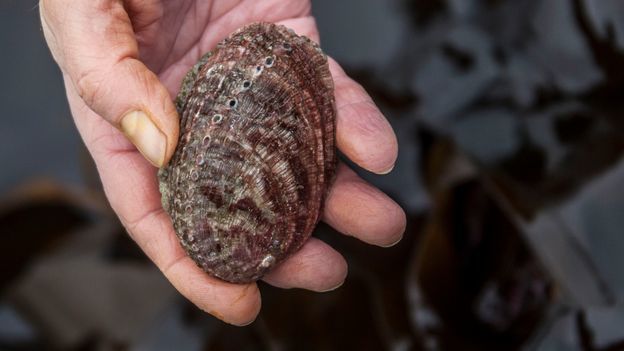 Considered a quintessential delicacy by locals, ormers have been traditionally collected on the island for centuries
Considered a quintessential delicacy by locals, ormers have been traditionally collected on the island for centuries
Unsurprisingly, such vast harvests hit ormer numbers. Guernsey imposed the first regulations to limit the harvest as far back as 1876, while ormer “season” was cancelled for three years in a row from 1974 to 1976.
Though the population remains far below past historical levels, there are now conservation efforts like Project Ormer, which began in 2018 under the auspices of La Société Guernesiaise. Led by marine biologist Laura Bampton, volunteers carry out surveys at low tide, tagging ormers they find with a coded yellow label, fixed to the shell with water-activated glue.
“The ormer tagging project has really captured people's imagination – Guernsey people love to talk about ormers,” said Bampton. “It's great that so many people are interested, and not just in eating them. I hope we can engage more people in learning about our natural environment.”
“There is always a buzz around the island when ormer season is approaching and I love watching the gatherers on the beaches at low tide,” added Wendy Pedder from the island's tourist board. “The long-standing debate among islanders on how best to prepare and eat the ormers is part of Guernsey's culture.”











